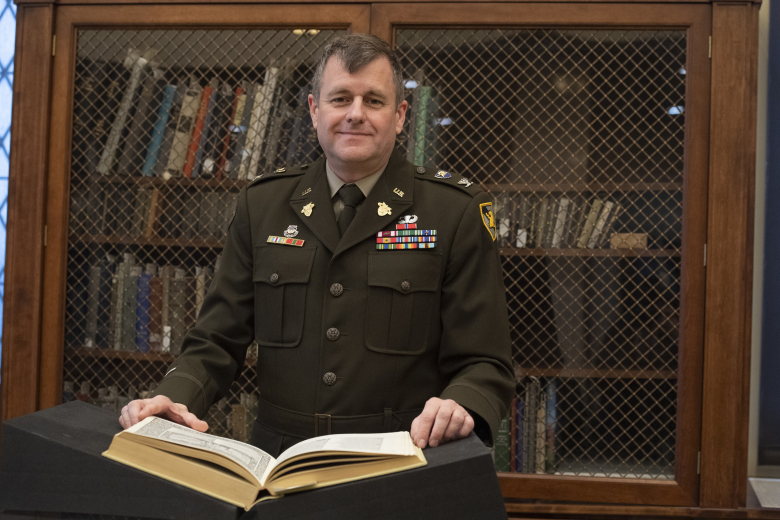Col. David Harper is passionate about books. That shouldn’t be surprising, considering that he is a professor of English and the head of the Department of English and Philosophy. An interest in book history informs Harper’s research and teaching, and he has been recognized as an expert in the field. He serves on the Board of Directors of the Rare Book School at the University of Virginia, and he is a member of New York City’s Grolier Club, the oldest book collectors club in North America.
He is also a letterpress printer, using traditional methods of printing with moveable metal type, which dates to the birth of print around 1450.
Now, Harper will have the opportunity to explore both interests. The U.S. State Department and the Fulbright Foreign Scholarship Board announced in September that Harper has received a U.S. Scholarship Program award to the United Kingdom to continue his research on the early history of printing in Britain at the University of York.
His project, “Decentering Print History in Britain 1600-1800,” examines the convergence of provincial printing with the political environment in Britain in the 17th century. The purpose is to broaden the study of printing and its impacts outside of its traditional center to include its lesser-known contributors and works.
Harper notes that his research has relevance today, as the intersection of early printing technology with political movements may inform our understanding of how the current development of various forms of media intersect with the political climate.
Harper’s recognition by the Fulbright Program reflects the extensive reach of U.S. Military Academy’s intellectual talent.
In addition to his research, Harper will teach undergraduate and graduate courses in the Department of English and Related Literature and the Centre for Renaissance and early Modern Studies at the University of York.
“I’m so excited to have this opportunity to research and teach at the University of York,” Harper said. “Due to its unique place in the history of printing in Britain, York is the ideal location for my continued research.”
Harper is looking forward to collaborating with colleagues who are world leaders in the area of his research focus, and having access to the Thin Ice Press, the University’s print laboratory.
Furthermore, the project will develop three of York’s research topics: “Cultural Communication,” and “Justice and Equality,” in which the role of women and other underrepresented workers in early printing culture are explored, and “Technologies for the Future,” which centers on the future of the book. The latter is fitting, as Harper teaches Book History at USMA, among other courses including British Literature and Shakespeare.
Another way that Harper’s research connects to USMA is through his impending work with York’s Humanities and Research Centre, which he says is a model for the proposed interdisciplinary West Point Humanities Center, slated to be completed by 2035. Dedicated to the human dimension of war, the Center is a gift-funded project which will serve as a focal point for studying the humanities and issues of national defense. It will be the only military academy humanities center.
“All research conducted by faculty contributes to the academic development of our cadets and USMA – research-led teaching is better teaching and having research-active faculty across all domains of academic interest and achievement is vital in order to keep West Point relevant as a premier institution of higher learning,” Harper said.
Faculty development is an important part of the West Point learning model. The academy will benefit greatly from the intellectual capital and experience that he will bring back to the Department of English and Philosophy faculty and cadets.
Learn more about Col. Harper and his research.
Learn more about the U.S. Fulbright Program, visit the 2022-23 American Scholar Award grantees/U.S.-UK Fulbright Commission.
Learn more about the West Point Humanities Center.
